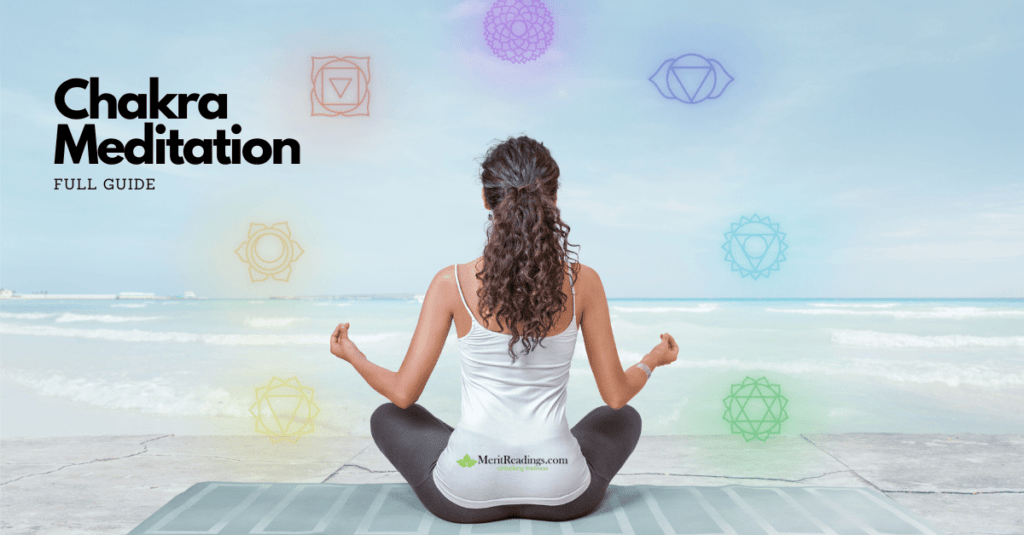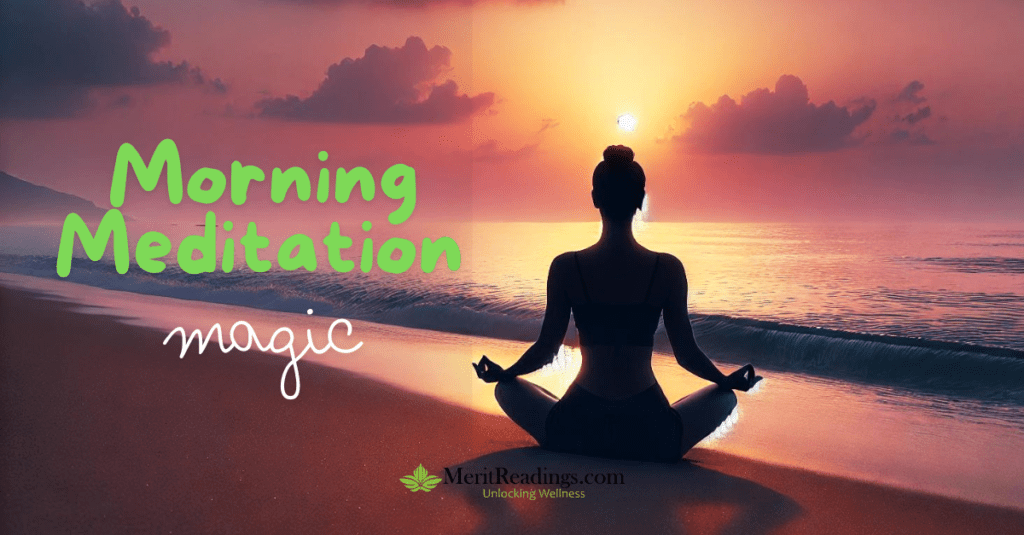Are you curious about chakra meditation but not sure where to start? Chakra meditation is a powerful way to connect with your body and mind, helping you feel balanced, grounded, and at peace. Learning simple hand positions for chakra meditation can make your practice even more effective and meaningful.
- What Is Chakra Meditation?
- What are the Main Seven Chakras
- Getting Started with Chakra Meditation: Preparation and Steps
- Chakra Meditation Practices to Try
- Using Frequencies in Chakra Meditation
- Tips for Maintaining Your Chakra Meditation Practice
- Common Challenges and How to Overcome Them
- Benefits of Chakra Meditation
- Conclusion
- FAQs
What Is Chakra Meditation?
Chakra meditation is all about focusing on the energy centers in your body, called chakras. Think of them as little spinning wheels of energy that help you feel balanced, calm, and full of life. But you might feel tired, stressed, or stuck when they’re not balanced.
Choosing a comfortable chakra meditation pose makes it easier to connect with these energy centers. It’s a simple and easy way to feel better in your body, mind, and emotions.
What are the Main Seven Chakras
Before we begin meditating, let’s learn about the seven main chakras. Each chakra has its own color and location in the body. Visualizing these colors and their locations can make meditation and chakras practice easier and more effective.
- Root Chakra meditation
The Root Chakra, or Muladhara, is located at the spine and is connected to the color red. This chakra is all about grounding and feeling secure, like your personal anchor to the world. Root chakra meditation is the foundation of the other chakras, keeping you connected to a sense of stability and safety. When you focus on this chakra, you might use the mantra “Lam” to feel more balanced and grounded, like roots connecting you deeply to the earth.
- Sacral Chakra
The Sacral Chakra, or Svadhisthana, is located just below your navel and is linked to the color orange. It’s the center of your emotions, creativity, and pleasure. Svadhisthana means “one’s own place,” connecting you to your unique desires and creative energy. The mantra “Vam” helps encourage the flow of joy. You can use any sacral chakra meditation script to balance this energy and boost creativity and emotional well-being.
- Solar Plexus Chakra
The Solar Plexus Chakra stands out in the stomach area with its bright yellow center of confidence, personal power, and willpower. Known as Manipura, meaning “city of jewels,” this chakra strengthens our inner power and helps us feel capable and in control. By focusing on “Ram” as a mantra here, you’re reminding yourself of your own strength and determination, fueling your inner drive and sense of confidence.
- Heart Chakra
The Heart Chakra, or Anahata, is in the center of your chest and is connected to the color green (sometimes pink). It represents love, compassion, and empathy, helping you connect with others and yourself. Anahata means “unstruck,” symbolizing the pure, open energy of love. Chanting the mantra “Yam” can help you feel more love and kindness. You can use any heart chakra meditation script to deepen your connection and boost feelings of love and openness.
- Throat Chakra
The Throat Chakra, or Vishuddha, is all about clear communication and truth, located right in the throat and colored blue. Vishuddha means “pure,” reflecting its role in helping us express ourselves openly and honestly. When we focus here with the mantra “Ham,” it encourages us to speak from a place of integrity and clarity, aligning our inner thoughts with our words.
- Third Eye Chakra
Sitting between the eyes, the Third Eye Chakra is indigo and is called Ajna, which means “to perceive.” This chakra is our center of intuition, insight, and wisdom. By focusing on “Om” as a mantra, we can tap into a sense of inner knowing, strengthening our ability to see beyond the surface and trust our intuition. The Third Eye Chakra connects us to a deeper awareness, allowing us to access insights and visions beyond the physical.
- Crown Chakra Meditation
Finally, The crown chakra, or Sahasrara, is at the top of your head and is connected to spiritual awareness and enlightenment. Crown chakra meditation is best done in silence, allowing you to connect with higher consciousness and spirituality. A crown chakra meditation script can help guide you in deepening this connection and enhancing your practice.
Here’s a quick reference table summarizing the essential details about each chakra:
| Chakra | Location | Color | Meaning | Mantra | Key Focus |
| Root Chakra | The base of the spine | Red | Grounding and security | Lam | Stability and safety |
| Sacral Chakra | Lower abdomen | Orange | Creativity and pleasure | Vam | Emotions and joy |
| Solar Plexus Chakra | Stomach area | Yellow | Confidence and personal power | Ram | Inner strength |
| Heart Chakra | Center of the chest | Green | Love and compassion | Yam | Connection and empathy |
| Throat Chakra | Throat | Blue | Communication and truth | Ham | Self-expression |
| Third Eye Chakra | Forehead, between the eyes | Indigo | Intuition and insight | Om | Inner wisdom |
| Crown Chakra | Top of the head | Violet/White | Spiritual connection and enlightenment | (Silence or Om) | Universal awareness |
Each chakra holds unique energy, and by working with them, you’re helping yourself find a natural balance. When they’re aligned, you’ll feel more connected to yourself and the world around you, which can make your meditation practice even more meaningful.
Getting Started with Chakra Meditation: Preparation and Steps
- Create Your Meditation Space
Select a place that is cozy, quiet, and where you can relax without interruptions. Set the mood with soft music, dim lighting, or a lit candle to create a calm atmosphere. You can also add some calming essentials like lavender or sage, or even use chakra essential oils that correspond to each energy center. These oils can enhance your meditation practice by supporting each chakra’s energy.
- Set an Intention
Before you begin, set a positive intention. Think about what you want to focus on, like “balance,” “clarity,” or “healing.” Keeping this intention in mind can help center you during the meditation.
- Find a Comfortable Position
Sit or lie down in a relaxed position. Keep your body relaxed, with your arms by your sides and legs slightly apart. This position encourages full-body relaxation, especially if you’re meditating before bed.
- Focus on Your Breath
Start with a few deep breaths. Inhale deeply, filling your belly, and then exhale slowly. Let each breath relax your mind and body, grounding you and setting a calm foundation.
- Visualize Each Chakra
Start with the Root Chakra. Picture a red light shining at the base of your spine. Then, move up to each chakra meditation colors. Imagine its color and feel its warmth.
Root (red) → Sacral (orange) → Solar Plexus (yellow) → Heart (green) → Throat (blue) → Third Eye (indigo) → Crown (violet).
- Use Affirmations
As you focus on each chakra, silently repeat a positive affirmation that resonates with it:
- Root Chakra: “I am grounded and secure.”
- Sacral Chakra: “I embrace my creativity and joy.”
- Solar Plexus Chakra: “I embrace my strength and confidence.”
- Heart Chakra: “I am filled with love and compassion.”
- Throat Chakra: “I honor and express my truth openly.”
- Third Eye Chakra: “I believe in my intuition.”
- Crown Chakra: “I am attached to the universe.”
Chakra Meditation Practices to Try
You have a few options for practicing chakra meditation. Experiment to find what works best for you.
Guided Chakra Meditation: Guided meditations can be really helpful, especially when you’re just starting out. You can find best guided chakra meditation options on YouTube, meditation apps, or even podcasts. The guide will walk you through each chakra, so all you need to do is listen and relax.
Self-Guided Chakra Meditation: Once you feel more comfortable, try doing a self-guided meditation. Visualize each chakra and repeat your affirmations. Going at your own pace can be empowering and helps you develop your own style.
Sound Meditation: Another powerful option is sound meditation. Certain sounds or frequencies are thought to resonate with different chakras. Try listening to soothing music, chanting, or even binaural beats that align with specific chakras. Sound can really amplify your experience!
Using Frequencies in Chakra Meditation
You can make your chakra balancing meditation even better by using certain frequencies. Each chakra is linked to a specific frequency, and listening to music or sounds at these frequencies can help you connect with your energy centers. It’s an easy way to make your meditation feel deeper and more calming.
Here’s a quick guide to the frequencies often associated with each chakra:
| Chakra | Frequency (Hz) | Description |
| Root Chakra | 396 Hz | Helps release fear and grounding energy |
| Sacral Chakra | 417 Hz | Supports creativity and emotional release |
| Solar Plexus | 528 Hz | Enhances confidence and transformation |
| Heart Chakra | 639 Hz | Promotes love, compassion, and relationship harmony |
| Throat Chakra | 741 Hz | Encourages clear communication and truth expression |
| Third Eye Chakra | 852 Hz | Supports intuition, insight, and mental clarity |
| Crown Chakra | 963 Hz | Connects to spiritual awareness and unity |
Tips for Maintaining Your Chakra Meditation Practice
- Start Small and Build Consistency
Chakra meditation doesn’t have to take hours! start with 5 to ten minute chakra meditation, and increase as you’re relaxed. Staying consistent matters – even a few minutes each day adds up over time.
- Experiment with Different Meditation Tools
Some people use tools like tuning forks or singing bowls to match each chakra’s frequency. These can help you focus and connect more deeply during meditation. Give them a try to enhance your practice!
- Try a Chakra Meditation Script
A chakra meditation script can guide you through each energy center, helping you focus and connect more deeply. You can find scripts online or create your own.
- Journal Your Experiences
After each session, jot down how you felt and any observations. Keeping track helps you notice patterns and progress, which can motivate you to keep going.
- Be Patient with Yourself
Balance doesn’t happen overnight, so be kind to yourself. If you miss a day or feel distracted, don’t worry. With each session, you’re building a stronger connection with your body and mind.
Common Challenges and How to Overcome Them
Starting a new practice can come with a few bumps. Here’s how to handle some common challenges.
- Feeling Distracted or Anxious: It’s totally normal! When your mind wanders, gently bring it back to your breathing or the chakra you’re focusing on.
- Difficulty Visualizing: Visualization can be tricky at first. Try looking at images of chakras to get a better idea of the colors and positions. You can also start with just one or two chakras that feel easier.
- Self-Doubt in the Process: You might wonder, “Am I doing this right?” Remember, there’s no “perfect” way. Just showing up for yourself is enough!
Benefits of Chakra Meditation
Let’s explore how chakra meditation can improve your life and help you feel more balanced and in tune with yourself.
- Balances Your Energy
Chakra meditation works to balance the energy in your body. If your chakras are blocked, it might cause both physical and emotional issues. Research of Alternative and Complementary Medicine shows that concentrating on specific energy centers while meditating can help clear these blockages, leading to an overall sense of well-being.
- Connects Your Mind and Body
When you focus on your chakras during meditation, you strengthen the connection between your mind and body. This awareness helps you notice any stiffness or pain you have, making it easier to handle.
- Helps You Handle Emotions
Chakra meditation helps you release strong feelings and makes you emotionally stronger. For example, when you work with the Heart Chakra, it can be easier to deal with feelings of love or grief, helping you find balance in your emotions.
- Boosts Spiritual Awareness
Practicing chakra meditation can help you feel more connected to yourself and the universe. Many people report a greater sense of purpose and satisfaction in life when they align their chakras.
- Aids Physical Healing
Chakra meditation is great for relaxation and reducing stress, which can help your body heal. For example, the Heart Chakra is linked to heart health, while the Solar Plexus Chakra is tied to digestion. Regular meditation can really boost your overall health.
Remember to celebrate those small wins along the way! They’re proof that you’re making progress and feeling better with each meditation.
Conclusion
Chakra meditation is a great way to bring balance, peace, and positive energy into your life. Take it one step at a time, and be kind to yourself. Enjoy the process—there’s no need to rush. Let yourself grow at your own pace.
If you want to learn more, try exploring different types of meditation or spend more time on each chakra. You can also add practices like breathwork or yoga to improve your chakra meditation. Books about chakra meditation can also help you understand and practice more deeply.
So, are you ready to try chakra meditation? You’ve got this! You’re getting closer to a more peaceful and fulfilled life every time you meditate.
FAQs
Q: How many times should I practice chakra meditation?
A: You can do this meditation 2-3 times a week. Once you’re comfortable, you can do it every day. Just check in with yourself and change it if you want.
Q: How can I know if my chakras are not balanced?
A: When chakras are unbalanced, you may feel physical discomfort or emotional issues. For example, your Throat or Solar Plexus Chakras might need attention if you feel anxious or have trouble expressing yourself.
Q: Are there any risks associated with chakra meditation?
A: Chakra meditation is safe for most people, but it may bring up strong emotions. Take it slow, and seek support if needed.
Q: How can I learn more about chakras?
A: Read books about chakra meditation, attend workshops, or take online courses. Connecting with others on the same journey can be helpful too.
Q: Do I need to believe in chakras for chakra meditation to work?
A: Belief in chakras can help, but it’s not necessary. What matters is your intention and focus during practice.
Q: Do I need special tools for chakra meditation?
A: No special tools are needed. Some people use crystals or singing bowls, but they’re optional. The focus is on your practice.



